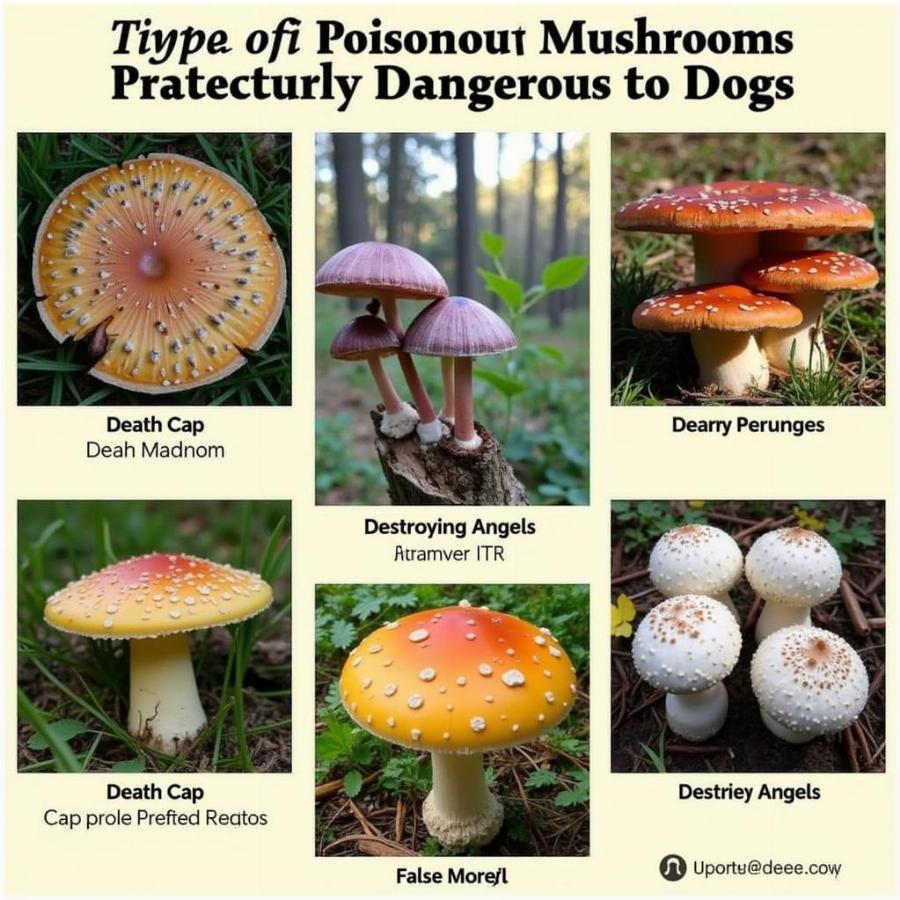If your dog ate a mushroom in your backyard, your heart likely skipped a beat. It’s a terrifying scenario for any dog owner, as some mushrooms are highly toxic. Knowing how to react swiftly and what information to gather can be the difference between a minor scare and a serious medical emergency. This article will guide you through the necessary steps to take if your dog consumes a wild mushroom, helping you navigate this stressful situation and ensure your furry friend’s safety.
Identifying the Mushroom: A Crucial First Step
Time is of the essence when your dog eats a mushroom. If possible, try to collect a sample of the mushroom, or if you can, take a clear photo. Note its size, shape, color, and any distinctive features. Even seemingly insignificant details can help a mycologist or veterinarian identify the species and assess its toxicity.
Immediate Actions to Take
After securing a sample or picture, contact your veterinarian or the ASPCA Animal Poison Control Center immediately. They are best equipped to advise you based on the specific type of mushroom ingested and your dog’s breed and size. Do not induce vomiting unless instructed to do so by a professional. Some toxins are absorbed more quickly through the digestive tract if vomiting is induced. Keep your dog calm and observe them for any signs of distress.
Common Signs of Mushroom Poisoning in Dogs
Mushroom poisoning symptoms can vary greatly depending on the species ingested. Some common signs include:
- Vomiting
- Diarrhea
- Weakness
- Lethargy
- Loss of coordination
- Seizures
- Jaundice
- Abdominal pain
- Excessive salivation
If your dog exhibits any of these symptoms, seek veterinary attention immediately. Early intervention is key to a positive outcome.
Preventing Future Incidents
The best way to protect your dog from mushroom poisoning is to prevent access to them. Regularly inspect your backyard and remove any mushrooms you find. Teach your dog the “leave it” command, which can be invaluable in preventing them from ingesting potentially harmful substances. You can also consider using a muzzle during walks in areas known for wild mushrooms, especially during damp weather when mushrooms are more prevalent.
Why are Dogs Attracted to Mushrooms?
Dogs explore the world through their noses, and the earthy scent of mushrooms can be intriguing to them. Some mushrooms have a texture that dogs might find appealing. Unfortunately, their natural curiosity can lead them to ingest toxic varieties.
My Dog Ate a Mushroom, Will it be Okay?
Whether or not your dog will be okay after eating a mushroom depends entirely on the type of mushroom ingested. Some mushrooms are harmless, while others are highly toxic. Therefore, immediate action and veterinary consultation are crucial.
What are the Most Dangerous Mushrooms for Dogs?
Some of the most dangerous mushrooms for dogs include Death Cap (Amanita phalloides), Destroying Angels (Amanita species), False Morels (Gyromitra species), and various species of Galerina, Lepiota, and Inocybe.  Nấm độc cho chó These mushrooms contain potent toxins that can cause liver failure, kidney failure, and even death.
Nấm độc cho chó These mushrooms contain potent toxins that can cause liver failure, kidney failure, and even death.
“Early identification and treatment are paramount in cases of mushroom poisoning. The sooner you seek veterinary care, the better the chances of a positive outcome for your pet.” – Dr. Emily Carter, DVM.
Conclusion
Discovering that your dog ate a mushroom in the backyard can be a frightening experience. By acting swiftly, gathering as much information as possible, and seeking immediate veterinary attention, you can significantly improve your dog’s chances of a full recovery. Remember, prevention is always the best approach. Regularly check your yard for mushrooms, and train your dog to avoid them. Your vigilance can safeguard your beloved companion from the potential dangers lurking in your own backyard.
FAQ
- What should I do if I can’t identify the mushroom my dog ate? Contact your veterinarian or the ASPCA Animal Poison Control Center immediately, even without identification.
- Can I induce vomiting at home if my dog eats a mushroom? No, do not induce vomiting unless instructed to do so by a veterinarian or animal poison control expert.
- Are all wild mushrooms toxic to dogs? No, not all wild mushrooms are toxic, but it’s impossible to tell which ones are safe without expert identification. It’s best to assume all wild mushrooms are potentially dangerous.
- What are the long-term effects of mushroom poisoning in dogs? Long-term effects depend on the type of mushroom ingested and the severity of the poisoning. Some dogs may experience permanent liver or kidney damage.
- How can I train my dog to avoid mushrooms? Teach your dog the “leave it” command and reinforce it consistently.
- Are store-bought mushrooms safe for dogs? While some store-bought mushrooms, like button mushrooms, are generally safe, it’s best to avoid feeding your dog any type of mushroom unless advised by a veterinarian.
- Are there any mushrooms that are beneficial for dogs? Certain medicinal mushrooms, like Shiitake and Maitake, are believed to have health benefits for dogs, but always consult your veterinarian before adding them to your dog’s diet.
Further Reading
You may find these articles helpful:
- dog stinkhorn mushroom
- weeds dangerous to dogs
- mushroom poisoning dogs
- what kind of mushroom is good dfor dogs
Beaut Dogs: Your Trusted Source for Dog Care Information
Beaut Dogs is your one-stop resource for all things related to dog care. We offer expert advice on breed selection, nutrition, training, health, and more. When you need reliable information and guidance, Beaut Dogs is here to help. When you need support please contact Email: [email protected] to get detailed and accurate answers from Beaut Dogs.